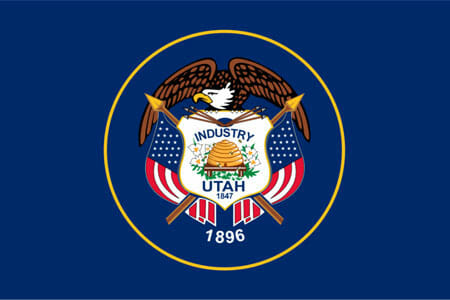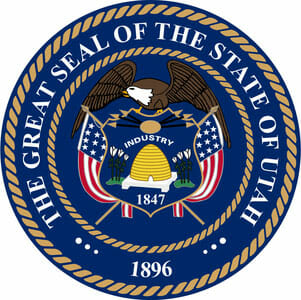Utah is very hostile toward gambling – its prohibition on this form of entertainment is embedded in its constitution, which undoubtedly has to do with the state’s Mormon roots. The only time Utah politicians made a move that benefited gambling enthusiasts was in 1925 when pari-mutuel horse race betting was legalized within state lines.
The new law caused a public outcry and were repealed in 1927, and Utah has remained a completely gambling-free state ever since. Utah legislators have been paying close attention to the latest trends in the industry for a long time, and they’ve responded by tightening the gambling prohibition instead of relaxing it.
Utah is home to eight federally recognized Indian tribes, but the state refused to sign compacts with them when the Indian Gaming Regulatory Act was passed in 1988. When other states were joining the Multi-State Lottery Association, Utah adamantly declined to establish a state lottery.
| Allowed? | Notes | |
| Land-based gambling | No | |
| Online gambling | No | |
| Sports betting | No | |
| Lottery | No | |
| Legal gambling age | N/A | Utah has no legal gambling |
Utah Gambling Law Summary
Utah defines the act of gambling as “risking anything of value upon the outcome of a contest, game, scheme, or gaming device when the return or outcome is based upon an element of chance and is in accord with an agreement or understanding that someone will receive something of value in the event of a certain outcome.”
“(1) A person is guilty of gambling if the person:
(a) participates in gambling, including any Internet or online gambling;
(b) knowingly permits any gambling to be played, conducted, or dealt upon or in any real or personal property owned, rented, or under the control of the actor, whether in whole or in part; or
(c) knowingly allows the use of any video gaming device that is:
(i) in any business establishment or public place; and
(ii) accessible for use by any person within the establishment or public place.”
Gambling is a class B misdemeanor, except when the person has been convicted two or more times under the aforementioned section, in which case it’s a class A misdemeanor. Class B misdemeanors are punishable by up to six months in jail and a fine of up to $1,000. Class A misdemeanors are considered more serious and are punishable by up to one year in jail and a fine of up to $2,500.
To conclude, if you live in Utah and want to gamble, the most sensible option would be to take a trip to Nevada.
Online Gambling in Utah
Utah's laws specifically forbid residents from participating in online gambling, per a 2012 amendment to the state code. Online players face a misdemeanor charge -- theoretically, at least, since no one in the US has ever faced a single citation for gambling online, not even in Utah. Those theoretical punishments get more severe with subsequent offenses.
The state responded to the online gambling boom by explicitly including this mode of play in its definition of unlawful gambling. DFS companies haven’t been chased out of Utah yet, but it’s only a matter of time seeing as Utah politicians have been calling for tighter regulations and enforcement for poker, which is also widely considered a game of skill, since at least 2013.
Utah Casinos
Casino games are completely illegal in Utah. Those looking to play them have no choice but to look beyond state borders. West Wendover, Nevada is a popular destination for gamblers from Utah, as evidenced by the fact that this town of 5,000 residents is capable of supporting five casinos, four of which house more than 35,000 sq. ft. of gaming space. As mentioned, playing online is illegal, and people who get caught playing on offshore sites could face class B misdemeanor charges.
Utah Poker
Playing poker for money is illegal in Utah, and this prohibition extends to home games with no rake involved. The boost in this game’s popularity following Chris Moneymaker’s 2003 WSOP victory resulted in tighter enforcement of the restrictive regulations, and the local authorities were unmoved whenever the argument that poker is a game of skill was raised. Playing poker over the internet in Utah is also explicitly prohibited, and using offshore sites could get you class B misdemeanor charges.
Utah Sports Betting
The last time something resembling sports betting was legal in Utah was in the 1920s. Today, both traditional sports betting and pari-mutuel horse race betting are completely illegal. Attempting to circumvent this prohibition by joining an offshore online sportsbook in Utah is a class B misdemeanor, though we don't know of anyone that's been prosecuted for wagering overseas.
Utah Daily Fantasy Sports
High-profile DFS platforms like FanDuel, DraftKings, or Yahoo DFS accept players from Utah, but this is more of an oversight on the part of Utah legislators than a sign of changing times. If a dedicated DFS bill is ever proposed in Utah, it will likely be limited to extending the general gambling ban to paid DFS contests. What’s more, Utah residents who participate in paid DFS contests should be aware that they might be pursuing this hobby in violation of the law – the authorities are in no way obliged to follow the DFS companies’ interpretation that such contests are based on skill rather than chance.
Utah Lotteries
Utah is one of five states that don’t run a lottery. Purchasing tickets via a lottery concierge service is classified as unlawful gambling.
Utah Bingo
Unlike poker or casino games, live bingo is tolerated in Utah, but the businesses that offer it must get creative to avoid incurring the wrath of the law. For example, one restaurant in Salt Lake City relied on bingo to attract more customers. Technically speaking, the bingo cards were handed out as a free addition to each purchased meal. The restaurant in question was eventually raided by the police and shut down. Two lawsuits later, the owners reached a settlement with the city council and were allowed to continue offering this service provided patrons had the option to order a meal without a card. Naturally, most business owners prefer to avoid all this trouble, so the availability of live bingo is minimal. Online bingo is treated like any other form of gambling and therefore illegal.
Utah Gambling FAQ
Does Utah have casinos?
No. Casinos are strictly illegal in Utah along with all other forms of gambling. Your best bet is to head to the Nevada border town of West Wendover because that's where all the action is.
Can I play slots in Utah?
Not legally. There are no casinos in the state, and even playing an illegal game of chance could get you in trouble.
Is sports betting legal in Utah?
No, and Utah lawmakers are unmoved by the craze for state-by-state sports betting legalization that is currently sweeping America.
Does Utah have online gambling?
No, and Utah is one of the few states whose laws criminalize playing online gambling games, although the statute has never been enforced.
Do you get slot machines in bars in Utah?
If you do, the proprietor is breaking the law and could get in big trouble. You could, too, simply for playing the game.
What's the legal gambling age in Utah?
There is no legal gambling in Utah. Therefore, the question is redundant.
Utah Constitution
ARTICLE VI. LEGISLATIVE DEPARTMENT s 27
[Games of chance not authorized.]
Utah has passed legislation to opt out of any future federal legislation authorizing online gambling.
The Legislature shall not authorize any game of chance, lottery or gift enterprise under any pretense or for any purpose.
Utah Code
76-2-202. Criminal responsibility for direct commission of offense or for conduct of another.
Every person, acting with the mental state required for the commission of an offense who directly commits the offense, who solicits, requests, commands, encourages, or intentionally aids another person to engage in conduct which constitutes an offense shall be criminally liable as a party for such conduct.
76-10-1101. Definitions.
As used in this part:
(1)
(a) "Fringe gambling&"; means any gambling, lottery, or video gaming device which is:
(i) given, conducted, or offered for use or sale by a business in exchange for anything of value; or
(ii) given away incident to the purchase of other goods or services.
(b) "Fringe gambling&"; does not mean a promotional activity that is clearly ancillary to the primary activity of a business.
(c) Determination of whether a promotional activity is clearly ancillary under Subsection (1)(b) is by consideration of the totality of the circumstances, which may include one or more of these factors:
(i) the manner in which the business is marketed, advertised, or promoted;
(ii) whether and the degree to which the business provides instructions regarding the use or operation of the promotional activity, as compared to the use or operation of the goods or services sold by the business;
(iii) the availability and terms of any free play option to engage in the promotional activity;
(iv) whether any contest, sweepstakes, or other promotional entries provided to customers who purchase goods or services from the business provide any advantage in winning a prize over any advantage provided to participants in the promotional activity who do not purchase goods or services from the business;
(v) whether the goods or services promoted for purchase by the business are on terms that are commercially reasonable; and
(vi) whether any prize won by participation in the promotion may be parlayed into one or more additional opportunities to win an additional prize.
(2)
(a) "Gambling&"; means risking anything of value for a return or risking anything of value upon the outcome of a contest, game, gaming scheme, or gaming device when the return or outcome:
(i) is based upon an element of chance; and
(ii) is in accord with an agreement or understanding that someone will receive something of value in the event of a certain outcome.
(b) "Gambling&"; includes a lottery and fringe gambling.
(c) "Gambling&"; does not include:
(i) a lawful business transaction; or
(ii) playing an amusement device that confers only an immediate and unrecorded right of replay not exchangeable for value.
(3) "Gambling bet&"; means money, checks, credit, or any other representation of value.
(4) "Gambling device or record&"; means anything specifically designed for use in gambling or used primarily for gambling.
(5) "Gambling proceeds&"; means anything of value used in gambling.
(6) "Internet gambling&"; or "online gambling&"; means gambling or gaming by use of:
(a) the Internet; or
(b) any mobile electronic device that allows access to data and information.
(7) "Lottery&"; means any scheme for the disposal or distribution of property by chance among persons who have paid or promised to pay any valuable consideration for the chance of obtaining property, or portion of it, or for any share or any interest in property, upon any agreement, understanding, or expectation that it is to be distributed or disposed of by lot or chance, whether called a lottery, raffle, or gift enterprise, or by whatever name it is known.
(8) "Video gaming device&"; means any device that possesses all of the following characteristics:
(a) a video display and computer mechanism for playing a game;
(b) the length of play of any single game is not substantially affected by the skill, knowledge, or dexterity of the player;
(c) a meter, tracking, or recording mechanism that records or tracks any money, tokens, games, or credits accumulated or remaining;
(d) a play option that permits a player to spend or risk varying amounts of money, tokens, or credits during a single game, in which the spending or risking of a greater amount of money, tokens, or credits:
(i) does not significantly extend the length of play time of any single game; and
(ii) provides for a chance of greater return of credits, games, or money; and
(e) an operating mechanism that requires inserting money, tokens, or other valuable consideration in order to function.
76-10-1102. Gambling.
(1) A person is guilty of gambling if the person:
(a) participates in gambling, including any Internet or online gambling;
(b) knowingly permits any gambling to be played, conducted, or dealt upon or in any real or personal property owned, rented, or under the control of the actor, whether in whole or in part; or
(c) knowingly allows the use of any video gaming device that is:
(i) in any business establishment or public place; and
(ii) accessible for use by any person within the establishment or public place.
(2) Gambling is a class B misdemeanor, except that any person who is convicted two or more times under this section is guilty of a class A misdemeanor.
(3)
(a) A person is guilty of a class A misdemeanor who intentionally provides or offers to provide any form of Internet or online gambling to any person in this state.
(b) Subsection (3)(a) does not apply to an Internet service provider or hosting company as defined in Section 76-10-1230, a provider of public telecommunications services as defined in Section 54-8b-2, or an Internet advertising service by reason of the fact that the Internet service provider, hosting company, Internet advertising service, or provider of public telecommunications services:
(i) transmits, routes, or provides connections for material without selecting the material; or
(ii) stores or delivers the material at the direction of a user.
(4) If any federal law is enacted that authorizes Internet gambling in the states and that federal law provides that individual states may opt out of Internet gambling, this state shall opt out of Internet gambling in the manner provided by federal law and within the time frame provided by that law.
(5) Whether or not any federal law is enacted that authorizes Internet gambling in the states, this section acts as this state’s prohibition of any gambling, including Internet gambling, in this state.
76-10-1103. Gambling fraud.
(1) A person is guilty of gambling fraud if he participates in gambling and wins or acquires to himself or another any gambling proceeds when he knows he has a lesser risk of losing or greater chance of winning than one or more of the other participants, and the risk is not known to all participants.
(2) A person convicted of gambling fraud shall be punished as in the case of theft of property of like value.
76-10-1104. Gambling promotion.
(1) A person is guilty of gambling promotion if he derives or intends to derive an economic benefit other than personal winnings from gambling and:
(a) he induces or aids another to engage in gambling; or
(b) he knowingly invests in, finances, owns, controls, supervises, manages, or participates in any gambling.
(2) Gambling promotion is a class B misdemeanor, provided, however that any person who is twice convicted under this section shall be guilty of a felony of the third degree.
76-10-1104.5. Advertisement or solicitation for participation in lotteries -- Void in Utah.
(1) For purposes of this section:
(a) "Conspicuously printed" means printed in either larger or bolder type size than the adjacent and surrounding material so as to be clearly legible to any person viewing the print.
(b) "Lottery" means the same as defined in Section 76-10-1101
(2) It is unlawful for any person to distribute or disseminate any advertisement or other written or printed material containing an advertisement or solicitation for participation in any lottery unless the advertisement or solicitation contains or includes the words "Void in Utah" conspicuously printed.
(3) (a) Any person who is convicted of violating Subsection (2) shall be fined the sum of $2,500.
(b) Any person who is twice or more convicted under this section shall be fined the sum of $10,000.
76-10-1105. Possessing a gambling device or record.
(1) A person is guilty of possessing a gambling device or record if he knowingly possesses it with intent to use it in gambling.
(2) Possession of a gambling device or record is a class B misdemeanor, provided, however, that any person who is twice convicted under this section shall be guilty of a class A misdemeanor, and any person who is convicted three or more times under this section shall be guilty of a felony of the third degree.
76-10-1106. Duty of prosecuting attorney or law enforcement officer to prosecute offenses.
All prosecuting attorneys, sheriffs, constables, and peace officers who have reasonable cause to believe any person has violated any provisions of this part shall diligently prosecute those persons.
76-10-1107. Seizure and sale of devices or equipment used for gambling.
When any magistrate determines that any devices or equipment are being used or kept for the purpose of being used for gambling, the magistrate may authorize the county commissioner of the county where the seizure occurred, in conjunction with the sheriff, or if the seizure occurred within the limits of an incorporated city or town, may authorize its governing body, in conjunction with its chief law enforcement officer, to seize the devices or equipment and institute forfeiture proceedings in accordance with the procedures and substantive protections of Title 24, Chapter 1, Utah Uniform Forfeiture Procedures Act.
76-10-1108. Seizure and disposition of gambling debts or proceeds.
Any gambling bets or gambling proceeds which are reasonably identifiable as having been used or obtained in violation of this part may be seized and are subject to forfeiture proceedings in accordance with Title 24, Chapter 1, Utah Uniform Forfeiture Procedures Act.





